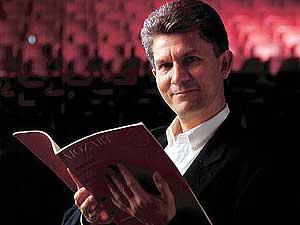|
Audio
Photos
More from MPR
Resources
Your Voice
|
Delfs leaving as SPCO adopts a new leadership model
January 7, 2004
 |
| Andreas Delfs will leave the SPCO at the end of his third season as music director. (Image courtesy of the Saint Paul Chamber Orchestra) |
St. Paul, Minn. — Last spring, under intense budgetary pressures, the SPCO and its musicians agreed on a new contract that cut musicians pay in exchange for more creative control of the orchestra. Today, the orchestra laid out the details of the new arrangment. It also announced Andreas Delfs would be departing as Music Director at the end of the current season. SPCO President Bruce Coppock says he and Delfs made a mutual decision.
|
People think about Hugh Wolff and the St Paul Chamber Orchestra, Pinchas Zuckerman and the St Paul Chamber Orchestra, Andreas Delfs and the St Paul Chamber Orchestra. We want people to think first and foremost of the St Paul Chamber Orchestra. This is part of a whole litany of concerted efforts to make the Orchestra the star.
- SPCO President Bruce Coppock |
"Throughout his role, we've wrestled with a seeming paradox, between the old 'top down' music director system, and an inherently collaborative system," Coppock said. "And we, together, came to the conclusion that having a music director in this organization wouldn't make any sense."
Under the SPCO's new system of artistic leadership, musicians will team up with members of managment to make the decisions normally consigned to the music director.
The responsibilities will fall on two groups.
The Artistic Vision Committee, comprised of three musicians and two management personnel, will decide on all aspects of programming, from repertoire selection and guest artists and conductors, to touring and recording.
The Artistic Personnel Committee, with the same musician and management configuration, oversees all personnel matters for the orchestra, including auditions and tenure review. While the responsibilities sound daunting, SPCO violinist and musicians' representative Thomas Kornacker says they're also exciting.
"It seemed like a dream when we were doing it, when we were discussing it," he said. "But it has become in today's discussion a reality, in that the musicians now control virtually their destiny."
The SPCO also announced it has appointed five so called artistic partners who will help the orchestra chart its future direction.
Bruce Coppock described them as artists in residence who will be working with the musicians several weeks each year, for periods of two or three years. All five were chosen in part because of their familiarity with the SPCO.
They include SPCO Baroque Series Director Nicholas McGegan, world renowned violinist Joshua Bell, Scottish conductor and oboist Douglas Boyd, pianist and composer Stephen Prutsman, and Italian conductor Roberto Abbado.
The SPCO's Bruce Coppock says all in all these partnerships will help the orchestra create better concerts. He says it also shifts the focus away from what he calls the orchestra's 'starcentric approach' to leadership.
"People think about Hugh Wolff and the St Paul Chamber Orchestra, Pinchas Zuckerman and the St Paul Chamber Orchestra, Andreas Delfs and the St Paul Chamber Orchestra," Coppock says. "We want people to think first and foremost of the St Paul Chamber Orchestra. This is part of a whole litany of concerted efforts to make the orchestra the star."
The new SPCO leadership model is common in Europe, but extremely rare in the U.S.
Jesse Rosen is Vice President of the American Symphony Orchestra League in Washington. He says across the American orchestral spectrum, musicians are taking on responsibilities beyond their artistic duties. But Rosen says the SPCO's new system goes a step further.
"This is certainly trend setting in bringing five artistic leaders working under the direction of committees that involve heavy musician participation," Rosen says. "So I think that aspect of it is new, but I think it is part of a larger trend to musician participation in musical and artistic matters."
Rosen says whether the SPCO's new model is replicated elsewhere in the U.S., or leads to a dismantling of the top down music director structure in the orchestra world, is still an open question.
|
News Headlines
|
Related Subjects
|
